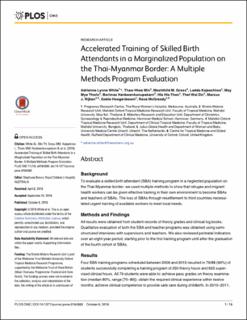Please use this identifier to cite or link to this item:
https://doi.org/10.21256/zhaw-4282Full metadata record
| DC Field | Value | Language |
|---|---|---|
| dc.contributor.author | White, Adrienne Lynne | - |
| dc.contributor.author | Min, Thaw Htwe | - |
| dc.contributor.author | Gross, Mechthild Maria | - |
| dc.contributor.author | Kajeechiwa, Ladda | - |
| dc.contributor.author | Thwin, May Myo | - |
| dc.contributor.author | Hanboonkunupakarn, Borimas | - |
| dc.contributor.author | Than, Hla Hla | - |
| dc.contributor.author | Zin, Thet Wai | - |
| dc.contributor.author | Rijken, Marcus J. | - |
| dc.contributor.author | Hoogenboom, Gabie | - |
| dc.contributor.author | McGready, Rose | - |
| dc.date.accessioned | 2018-07-16T12:45:55Z | - |
| dc.date.available | 2018-07-16T12:45:55Z | - |
| dc.date.issued | 2016-10 | - |
| dc.identifier.issn | 1932-6203 | de_CH |
| dc.identifier.uri | https://digitalcollection.zhaw.ch/handle/11475/8161 | - |
| dc.description.abstract | Background: To evaluate a skilled birth attendant (SBA) training program in a neglected population on the Thai-Myanmar border, we used multiple methods to show that refugee and migrant health workers can be given effective training in their own environment to become SBAs and teachers of SBAs. The loss of SBAs through resettlement to third countries necessitated urgent training of available workers to meet local needs. Methods and Findings: All results were obtained from student records of theory grades and clinical log books. Qualitative evaluation of both the SBA and teacher programs was obtained using semi-structured interviews with supervisors and teachers. We also reviewed perinatal indicators over an eight-year period, starting prior to the first training program until after the graduation of the fourth cohort of SBAs. Results: Four SBA training programs scheduled between 2009 and 2015 resulted in 79/88 (90%) of students successfully completing a training program of 250 theory hours and 625 supervised clinical hours. All 79 students were able to: achieve pass grades on theory examination (median 80%, range [70–89]); obtain the required clinical experience within twelve months; achieve clinical competence to provide safe care during childbirth. In 2010–2011, five experienced SBAs completed a train-the-trainer (TOT) program and went on to facilitate further training programs. Perinatal indicators within Shoklo Malaria Research Unit (SMRU), such as place of birth, maternal and newborn outcomes, showed no significant differences before and after introduction of training or following graduate deployment in the local maternity units. Confidence, competence and teamwork emerged from qualitative evaluation by senior SBAs working with and supervising students in the clinics. Conclusions: We demonstrate that in resource-limited settings or in marginalized populations, it is possible to accelerate training of skilled birth attendants to provide safe maternity care. Education needs to be tailored to local needs to ensure evidence-based care of women and their families. | de_CH |
| dc.language.iso | en | de_CH |
| dc.publisher | Public Library of Science | de_CH |
| dc.relation.ispartof | PLOS ONE | de_CH |
| dc.rights | http://creativecommons.org/licenses/by/4.0/ | de_CH |
| dc.subject | Clinical competence | de_CH |
| dc.subject | Curriculum | de_CH |
| dc.subject | Health personnel | de_CH |
| dc.subject | Maternal health services | de_CH |
| dc.subject | Refugees | de_CH |
| dc.subject | Thailand | de_CH |
| dc.subject | Young Adult | de_CH |
| dc.subject | Program evaluation | de_CH |
| dc.subject.ddc | 618: Geburtsmedizin und Hebammenarbeit | de_CH |
| dc.title | Accelerated training of skilled birth attendants in a marginalized population on the Thai-Myanmar border : a multiple methods program evaluation | de_CH |
| dc.type | Beitrag in wissenschaftlicher Zeitschrift | de_CH |
| dcterms.type | Text | de_CH |
| zhaw.departement | Gesundheit | de_CH |
| zhaw.organisationalunit | Institut für Hebammenwissenschaft und reproduktive Gesundheit (IHG) | de_CH |
| dc.identifier.doi | 10.21256/zhaw-4282 | - |
| dc.identifier.doi | 10.1371/journal.pone.0164363 | de_CH |
| dc.identifier.pmid | 27711144 | de_CH |
| zhaw.funding.eu | No | de_CH |
| zhaw.originated.zhaw | Yes | de_CH |
| zhaw.publication.status | publishedVersion | de_CH |
| zhaw.publication.review | Peer review (Publikation) | de_CH |
| Appears in collections: | Publikationen Gesundheit | |
Files in This Item:
| File | Description | Size | Format | |
|---|---|---|---|---|
| 2016_Gross_Accelerated_Training_of_skilled_birth.PDF | 1.17 MB | Adobe PDF |  View/Open |
Show simple item record
White, A. L., Min, T. H., Gross, M. M., Kajeechiwa, L., Thwin, M. M., Hanboonkunupakarn, B., Than, H. H., Zin, T. W., Rijken, M. J., Hoogenboom, G., & McGready, R. (2016). Accelerated training of skilled birth attendants in a marginalized population on the Thai-Myanmar border : a multiple methods program evaluation. Plos One. https://doi.org/10.21256/zhaw-4282
White, A.L. et al. (2016) ‘Accelerated training of skilled birth attendants in a marginalized population on the Thai-Myanmar border : a multiple methods program evaluation’, PLOS ONE [Preprint]. Available at: https://doi.org/10.21256/zhaw-4282.
A. L. White et al., “Accelerated training of skilled birth attendants in a marginalized population on the Thai-Myanmar border : a multiple methods program evaluation,” PLOS ONE, Oct. 2016, doi: 10.21256/zhaw-4282.
WHITE, Adrienne Lynne, Thaw Htwe MIN, Mechthild Maria GROSS, Ladda KAJEECHIWA, May Myo THWIN, Borimas HANBOONKUNUPAKARN, Hla Hla THAN, Thet Wai ZIN, Marcus J. RIJKEN, Gabie HOOGENBOOM und Rose MCGREADY, 2016. Accelerated training of skilled birth attendants in a marginalized population on the Thai-Myanmar border : a multiple methods program evaluation. PLOS ONE. Oktober 2016. DOI 10.21256/zhaw-4282
White, Adrienne Lynne, Thaw Htwe Min, Mechthild Maria Gross, Ladda Kajeechiwa, May Myo Thwin, Borimas Hanboonkunupakarn, Hla Hla Than, et al. 2016. “Accelerated Training of Skilled Birth Attendants in a Marginalized Population on the Thai-Myanmar Border : A Multiple Methods Program Evaluation.” Plos One, October. https://doi.org/10.21256/zhaw-4282.
White, Adrienne Lynne, et al. “Accelerated Training of Skilled Birth Attendants in a Marginalized Population on the Thai-Myanmar Border : A Multiple Methods Program Evaluation.” Plos One, Oct. 2016, https://doi.org/10.21256/zhaw-4282.
Items in DSpace are protected by copyright, with all rights reserved, unless otherwise indicated.